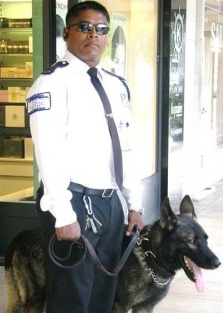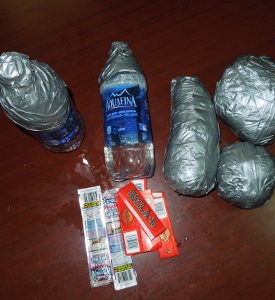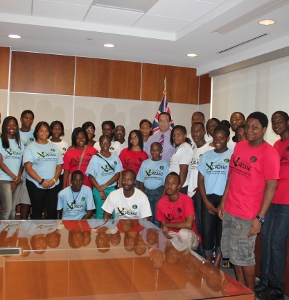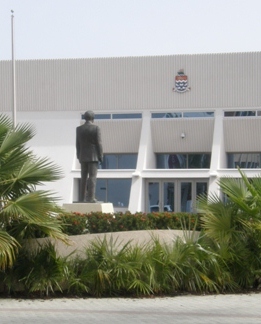Archive for August 20th, 2013

Thief has bad day trapped between dog and top cop
 (CNS): A hapless shoplifter had a bad day on Friday morning after he found himself trapped between a trained security dog ready to attack and the police commissioner as he tried to flee the scene of a grab and dash at Kirk Freeport. The RCIPS confirmed that David Baines happened to be driving along Fort Street when he saw a man being chased by a security guard. The country’s top cop stopped his car and detained the suspect, who was later arrested for shoplifting. The suspect had stopped in his tracks with the dog and the security guard behind him at the traffic lights of Fort Street only to turn and see the police commissioner in front of him after a foot chase through downtown George Town.
(CNS): A hapless shoplifter had a bad day on Friday morning after he found himself trapped between a trained security dog ready to attack and the police commissioner as he tried to flee the scene of a grab and dash at Kirk Freeport. The RCIPS confirmed that David Baines happened to be driving along Fort Street when he saw a man being chased by a security guard. The country’s top cop stopped his car and detained the suspect, who was later arrested for shoplifting. The suspect had stopped in his tracks with the dog and the security guard behind him at the traffic lights of Fort Street only to turn and see the police commissioner in front of him after a foot chase through downtown George Town.
The Security Centre’s employee was on duty with one of the firm’s dogs patrolling Kirk Freeport plaza on Cardinal Avenue when he was alerted to the theft and the chase began. A spokesperson from the security firm said their employee, Om Thapa, was alerted by staff at La Parfumerie II that a man just grabbed some goods from the store and fled. Pointed in the direction of where the thief had run, Thapa chased after him with his dog.
With the help of his colleague, Leonardo Solomon, who was also on duty in the area and who spotted the suspect as he ran behind Burger King, Thapa continued his pursuit of the culprit through the grounds of Elmslie Church, onto Harbour Drive and stopped when the suspect was cornered at the intersection of North Church and Fort Street.
Face-to-face with the accused, The Security Centre guard and dog handler gave a verbal warning to the suspect that the dog, trained to high standards of obedience, agility and protection, would be released should the chase continue. The man stayed put and in an eerie coincidence, it was Police Commissioner David Baines' car stopped at the traffic light, which then took him into custody.
Stuart Bostock, President & CEO of The Security Centre Limited, said, “Unfortunately, we’re hearing from more and more local business owners that petty theft is on the rise,” he said. "Our guards are often deterrent enough, but they are also trained to intervene when it’s safe to do so and they have the skills required of reliable witnesses that can assist authorities in bringing criminals to justice. In this case, Mr Thapa’s background in the Nepalese Special Forces surely came into play. This is exactly the outcome we hope for in cases like this,” he added.
One inmate recaptured
(CNS): After almost six days on the run, the police have captured one of the three inmates who escaped from HMP Northward last Wednesday night. Chadwick Dale, a 22-year-old Jamaican national, was located and arrested in North Side Tuesday lunchtime following a targeted intelligence-led operation and was taken back into custody by officers. Dale, who was recently sentenced to six years imprisonment following a violent robbery, now faces further charges and even more time behind bars as a result of the jail break. Meanwhile, his fellow inmates, 44-year-old Steve Manderson and his son, Marcus, remain at large and the police search continues for the men who police believe could still be in the area.

Sex Education – how much is enough?
As teenagers begin their journey, with added pressures to growing up, not only do their hormones work over time, but there are many physical changes taking place in the body structure. Developing sex organs make the teenager curious to explore these changes. Added to this, there is often a curiosity to indulge in what is forbidden.
Sexual activity combined with the absence of knowledge to control these impulses brings the sexual arena into constant focus among teens. For these reasons it is of paramount importance that teens have access to sex education at schools in the Cayman Islands. Unfortunately, this information is not freely available to teenagers, who are at the most vulnerable and impressionable age of their lives. Uninformed teenagers are most likely to make poor decisions that will drastically change their lives forever.
Teen pregnancy in the Cayman Islands has historically been shrouded by ignorance on the issue. It is a common belief that “teenage pregnancy only happens to the person with multiple partners” or “not my child”. This is so far from the truth that it is not even funny.
The illusion that Cayman is of Christian heritage and the notion that sexual intercourse is the forbidden fruit that is restricted from teenagers until marriage has added to the censorship of sexual education being taught at our schools on a full time basis. Some parents are unwilling to have an open mind to frank and open discussions needed in educating teenagers, and their unwillingness to engage their teens adds to the frustration the policy makers, educators and counselors are experiencing when they are brought in to clean up this mess – after the fact.
Studies show that informed teenagers will make better decisions if they have knowledge of the relevant facts. So why are parents blocking this process? Is it because they themselves were not exposed to this educational process? Or is it the fear of losing their child? Some parents are sheltering the child and thus avoiding the issues. They argue that this is a better approach than having regular sex education classes taught in schools for fear of creating a rush to have premature sexual encounters. Regrettably, this attitude is causing more harm than good.
In Cayman, the stats shows that most teenage pregnancies stem from single parent homes. A third of the teens who get pregnant have experiencedsome sort of negative sexual experience, either in the form of rape, incest or sexual abuse, and have had problems with the law. Some teens get pregnant to escape an abusive and violent home life. A very small number get pregnant because they want to. The highest numbers of teens that end up getting pregnant is usually due to carelessness, and without the use of condoms.
Teens are going to have sex regardless of the restrictions placed on them. A comprehensive sex education plan has to be implemented at schools that will cover all areas of risk and consequences, including the various types of protection, negotiation skills, awareness of sex offenders, infectious diseases, and financial responsibility. Details on how to correctly wear a condom is essential. So having these lessons taught in schools with open discussions in class with peers sends a strong message, as everyone will be on the same page, rather than trying to teach this to your child in isolation. Having the added benefit of parental support at home and in the school will better educate teenagers on these issues and better prepare them for the real world.
Teenage pregnancy in Cayman is high when compared to other Caribbean Islands, which confirms the need for more to be done. Teenagers will talk to their peers and unauthorized sources to get the answers to their questions when parents are not approachable, this will increase the chances of risky behaviors. If the schools are not allowed to teach and give them the information, then who will?
Teenagers are vulnerable due to their lack of wisdom and their exposure to all sorts of influences that will cloud their judgment and prevent them making the right decision whenever the occasion presents itself. Teens need to be taught how to negotiate out of compromising propositions and have the skills necessary to make responsible decisions. Recent trends pose fundamental concerns about the health and social development of children born to young women. When teens get pregnant and quit school to support their young family, they do not complete their education. As a result, the teen mother and the society both lose. The child often then repeats this cycle when they become of childbearing age.
The teen culture has changed and we as a society must change in order to address this growing problem. Finding appropriate responses to these problems has been made all the more complex by the social revolution brought by rapid modernization. People in Cayman are more prosperous than some other Caribbean Islands but attitudes toward sex, motherhood and public policy are still influenced by yesterday’s traditional norms.
Teens are bullied by other teens, and when a teen is accused of being a virgin they might resolve to have premature sex to fit in. The gap between the ‘haves’ and the ‘have nots’ puts financial pressure on teens to accept gifts, which can lead to manipulation and sexual favors. The teen that is ‘hot’ and the teen that is not often leads to promiscuous behaviour. Who can afford a blackberry and who cannot? These might seem like simple gripes by adult standards but to teenagers these are major issues and if not taken seriously will add to them developing low self-esteem that can accelerate the rate of risky behaviors. A teen that is experiencing these issues might also turn to drugs and alcohol, which have the effect of lowering a person’s ability to say no, thereby creating another set of problems for the teen and society.
There is no limit to the amount of sexually education needed for teenagers. They are doing it and society has to talk about it. Today’s teen culture and the pressures they face are the driving factors to stop the ignorance and give this issue the attention it rightly deserves.

Booze, drugs found in prison
 (CNS): More alcohol, a sizable stash of drugs and a Blackberry were found at HMP Northward over the weekend during a search of inmates’ cells. Officials say that this latest haul of contraband was found in the facility’s Bravo Wing on Sunday, 18 August. In one cell they found two bottles of what appears to be white rum (1 litre each), five packs of Rizlas, two packs of double platinum tobacco cigar wraps, and three parcels of vegetable matter resembling ganja (weighing roughly 2lbs 10oz with wrapping). In another cell they found a Blackberry Curve mobile phone. Director of Prisons Neil Lavis explains that the search of the cells took place after a prison officer saw an inmate run back to a cell block after picking up a package that had been thrown over the fence.
(CNS): More alcohol, a sizable stash of drugs and a Blackberry were found at HMP Northward over the weekend during a search of inmates’ cells. Officials say that this latest haul of contraband was found in the facility’s Bravo Wing on Sunday, 18 August. In one cell they found two bottles of what appears to be white rum (1 litre each), five packs of Rizlas, two packs of double platinum tobacco cigar wraps, and three parcels of vegetable matter resembling ganja (weighing roughly 2lbs 10oz with wrapping). In another cell they found a Blackberry Curve mobile phone. Director of Prisons Neil Lavis explains that the search of the cells took place after a prison officer saw an inmate run back to a cell block after picking up a package that had been thrown over the fence.
“We will continue to take prompt action against those whom we suspect of having contraband. This was a piece of good work from the officer involved,” Lavis said.
On 9 August, prison officers found a tightly wrapped package containing 2lbs of ganja and a bottle of Bailey’s Irish Cream that had been tossed over the 15 foot security fence for inmates. The package was found during a regular check of the perimeter fences.
Last month, a bag containing around five ounces of ganja, a box of smoking papers, a smart phone and charger was also thrown over the perimeter fence at HMP Northward. Officials said at the time that they were looking at the prison's cameras to try and identify the person who attempted to deliver the parcel over the prison fence to an inmate. No update has been given on this, however.
While members of the public who are caught throwing illegal items into the prison are subject to criminal prosecution, the inmates who intercept them lose remission time from their sentences.

Ex-customs officer on trial over drugs and rum cakes
(CNS): Former local customs office David Karl Lobo faced charges in Grand Court on Monday morning of being concerned in the importation of cocaine. The charges are in connection with a major drug smuggling investigation where cocaine was believed to have been smuggled through Cayman to the UK in local rum cakes. Lobo was one of a number of customs officers caught up in the investigation, which goes back to 2010 and was linked to the arrest in the UK of three men from Cayman who were caught with the drugs. The crown believe that Lobo (28) assisted with the smuggling of at least 2lbs of cocaine.
The drugs were said to have been stashed inside rum cake boxes, which were held in the customs store room at the airport with duty free items bought by passengers as they departed the island .
Lobo has denied the charges and the trial continues this week before a jury of six women and one man in Court Five.

January designated as youth month by premier
 (CNS): A proclamation document was signed by the Cayman Islands premier on Friday designating January as ‘Supporting Our Youth Month in the Cayman Islands’ when the well-being of Cayman’s young people will become a national celebration. The campaign to promote youth issues was driven by the Cayman Islands Youth Development Consortium which has been working in the area of youth development with various partners, grounded in the principle that supporting youths in asset building is key to helping them become successful adults, which is stated in the proclamation.
(CNS): A proclamation document was signed by the Cayman Islands premier on Friday designating January as ‘Supporting Our Youth Month in the Cayman Islands’ when the well-being of Cayman’s young people will become a national celebration. The campaign to promote youth issues was driven by the Cayman Islands Youth Development Consortium which has been working in the area of youth development with various partners, grounded in the principle that supporting youths in asset building is key to helping them become successful adults, which is stated in the proclamation.

Expert spells out policy for politicians
 (CNS): Ministers, councillors and political advisors in the new PPM government have been attending a number of workshops on government’s policy framework to ensure the proper development and implementation of policies and so that documents outlining the goals and ambitions of government don’t end up gathering dust on shelves. The workshops are being held by Robert Lewis, the director of the Policy Coordination Unit, who held similar sessions last year with civil service management. Cabinet Secretary Samuel Rose, whose office coordinates the development and implementation of government-wide policy, organized the sessions.
(CNS): Ministers, councillors and political advisors in the new PPM government have been attending a number of workshops on government’s policy framework to ensure the proper development and implementation of policies and so that documents outlining the goals and ambitions of government don’t end up gathering dust on shelves. The workshops are being held by Robert Lewis, the director of the Policy Coordination Unit, who held similar sessions last year with civil service management. Cabinet Secretary Samuel Rose, whose office coordinates the development and implementation of government-wide policy, organized the sessions.
“The ultimate aim of policy training is to enhance services to stakeholders and the public by properly developing policies and implementing them effectively,” Rose said in a release from government. “The Cabinet Office is committed to furthering this aim in the public interest and we believe the public will soon start to feel the benefits of this approach.”
Lewis, who holds a master’s degree in Public Policy and Management, said that unless a policy is properly developed, it is likely to be partly implemented, ineffective or shelved.
Pointing to Vision 2008, a strategic national plan that was only ever partially adopted, as an example, he explained that policies have to be championed and steered by politicians, but buy-in from everyone involved, especially key stakeholders, is very important to policy success and, as a result,, there must be a good balance of stakeholders at the table when policies are created. A positive example cited is the new disability policy being developed, where people with disabilities and their support organisations are represented on steering and other committees.
Policy could also stall as a result of over-reliance on expert advice, he warned. If local stakeholders find expert opinion less than credible, based on what they know about their context, chances are they won’t support the policy.
Researchers should also explore what some may view as unforeseen consequences, Lewis said. He explained that when forming revenue-based policies, projections versus actual results where the policy was tried elsewhere, the true cost of administering the policy and any altered behavior it would create or loopholes have to be examined before a decision is made to implement.
Lewis said policies should also be reviewed and evaluation by entities other than implementers to makesure that the end results are achieved and to avoid conflict of interest and encourage accountability.
National policies should have action plans, including who is going to do the work, what the scope of the work entails, the resources needed and when results can be expected, he said. And although national policies may have long term aims, evidence of short-term progress is necessary to show that they are working.

Crown will appeal sex offender sentence
(CNS): Director of Public Prosecutions Cheryll Richards has said her office will be appealing the six month sentence handed down to a convicted sex-offender in Summary Court last week by the chief magistrate. The local man was given three sentences after he had admitted molesting his 8-year-old daughter and making her watch pornography. The longest sentence for indecent assault was nine months and two other assault sentences were ordered to run concurrently by the judge, who then suspended three months, cutting the man’s jail time to just six months, despite the severity of the crime and the trauma suffered by the young victim.
The DPP’s office issued a short statement Monday to Cayman 27 stating that the matter had been reviewed by the office and a decision to appeal had been made.
The sentence outraged the community and local activist Sandra Catron started a petition on Friday to press for an appeal in the case and ask legislators to introduce minimum sentences for sex offences. The petition has already collected close to 500 signatures, reflecting the concerns that many people have that the issue of child abuse, which the judiciary has acknowledged is all too prevalent in our small society, is not being taken seriously.
"I am very pleased that the DPPs office has decided to do something about this offensive sentence," Catron told CNS Tuesday following the DPP's decision. "This demonstrates the power of the people’s voice in this community and we need to speak out more. This addresses the immediate issue with this particular matter but I encourage people to still continue signing the petition. The larger issue of low sentences for this type of offence has to be addressed and a long term solution implemented," she said. "I would like to personally thank all of the people who have stepped up and voiced their opinion on this topic."
As well as minimum sentences, Catron wants to see the implementation of a counselling facility with specialized professionals with experience in child sexual abuse.
Related article on CNS:

Football scout spots talented players
 (CNS): As Cayman’s hopes of qualifying for the Uner-15 CONCACAF tournament semi-finals fade, their hopes for future footballing glory are still very much alive. The academy manager for Swindon Town Football Club in the UK, where three young Cayman footballers are already in attendance, has said he could be picking up a few more for the club's youth programme. Jeremy Newton is in the Cayman Islands for the tournament and scouting more players, particularly from Cayman, as a result of the existing relationship between Swindon Town and CIFA and because he sees the islands as a genuine source of footballing talent.
(CNS): As Cayman’s hopes of qualifying for the Uner-15 CONCACAF tournament semi-finals fade, their hopes for future footballing glory are still very much alive. The academy manager for Swindon Town Football Club in the UK, where three young Cayman footballers are already in attendance, has said he could be picking up a few more for the club's youth programme. Jeremy Newton is in the Cayman Islands for the tournament and scouting more players, particularly from Cayman, as a result of the existing relationship between Swindon Town and CIFA and because he sees the islands as a genuine source of footballing talent.
Newton spoke to AtWater Consultiing, which produces the Cayman Sports Documentary Series, and told them that he has identified some more local players he thought might warrant a try-out in England,
“I’m looking at anyone, but more importantly the Cayman players,” he said. “I think there’s an abundance of talent on the island,” he said. “I think there’s always going to players [from Cayman capable of going to Swindon], whether it’s this year, next year or sometime after that.”
Children who are offered contracts and go to Swindon have to attend a nearby school. The academy only has 150 boys from age 6 to 18, with each age group having about 16 players. The best of the players at age 15 are offered a two-year contract to play for the Swindon Town Football Club youth team, where they actually get paid to play and finished their education. The elite players from the youth team can then have their contracts purchased by professional men’s leagues.
“It takes a lot of time and hard work in order to try and make the grade of becoming a professional football player,” Newton said. “I think in the current group of under-15s at the moment some will go on to play at the highest level and some will play in the leagues below that,” he said.
Regardless of how far a player goes, Newton says all of the players who attend Swindon Academy will go on to play football at some level, whether it be professional, on their national team or elsewhere, dependent on their personal talent and drive. They will also get to play against teams like Manchester United and Liverpool – which Sebastian and Kray two of Cayman’s football students have already done – and experience playing with players who will become among the best in the world at playing football.
Meanwhile, during the on-going tournament Honduras, which is carrying plenty of local support secured a place in the semi-finals during Monday’s action and Cayman will be back on the field tonight to take on Aruba and hoping to get a final win under their belts before they are forced to bow out of the tournament unless St Maarten can provide a miracle for the host team and beat Bermuda.
At the end of Tuesday’s play the semi-finals will be decided but at present it looks as though Bermuda will come out top of group A, while in group B Guatemala and Jamaica will fight it out Tuesday to see who advances. With tournament favourites Honduras securing the top spot in group C, the group D slot will also be decided Tuesday when El Salvador the group leaders face off against second place Haiti.

Robot to help hospital serve patients and cut costs
 (CNS): The Cayman Islands Seafarers Association has donated a state-of-the-art remote medical robot to the Cayman Islands Hospital that will enable local caregivers to get immediate access to medical specialists in the United States in medical emergencies and for consultation on various health issues. The robot means that patients and families will no longer have to make costly trips overseas for medical consultation, saving them and the government money. A demonstration of the robot was given at the hospital last week showing how medical professionals will use the technology.
(CNS): The Cayman Islands Seafarers Association has donated a state-of-the-art remote medical robot to the Cayman Islands Hospital that will enable local caregivers to get immediate access to medical specialists in the United States in medical emergencies and for consultation on various health issues. The robot means that patients and families will no longer have to make costly trips overseas for medical consultation, saving them and the government money. A demonstration of the robot was given at the hospital last week showing how medical professionals will use the technology.
‘Sally’ is a remote presence robot which will extend local physicians' and their patients' access to care well beyond the Cayman Islands' borders, giving direct access to consultants and specialists anywhere they are. The technology and connections allow doctors and health technicians here to zoom and move the camera system for the optimum viewing of patients by remote doctors, enabling them to help with diagnosis and care.